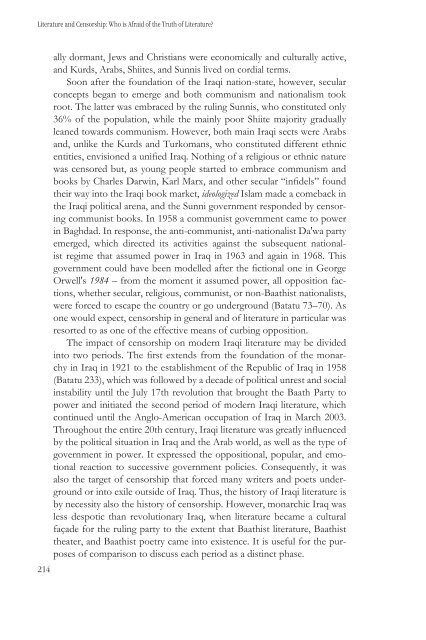Literatura in cenzura - Društvo za primerjalno književnost - ZRC SAZU
Literatura in cenzura - Društvo za primerjalno književnost - ZRC SAZU
Literatura in cenzura - Društvo za primerjalno književnost - ZRC SAZU
- No tags were found...
Create successful ePaper yourself
Turn your PDF publications into a flip-book with our unique Google optimized e-Paper software.
Literature and Censorship: Who is Afraid of the Truth of Literature?214ally dormant, Jews and Christians were economically and culturally active,and Kurds, Arabs, Shiites, and Sunnis lived on cordial terms.Soon after the foundation of the Iraqi nation-state, however, secularconcepts began to emerge and both communism and nationalism tookroot. The latter was embraced by the rul<strong>in</strong>g Sunnis, who constituted only36% of the population, while the ma<strong>in</strong>ly poor Shiite majority graduallyleaned towards communism. However, both ma<strong>in</strong> Iraqi sects were Arabsand, unlike the Kurds and Turkomans, who constituted different ethnicentities, envisioned a unified Iraq. Noth<strong>in</strong>g of a religious or ethnic naturewas censored but, as young people started to embrace communism andbooks by Charles Darw<strong>in</strong>, Karl Marx, and other secular “<strong>in</strong>fidels” foundtheir way <strong>in</strong>to the Iraqi book market, ideologized Islam made a comeback <strong>in</strong>the Iraqi political arena, and the Sunni government responded by censor<strong>in</strong>gcommunist books. In 1958 a communist government came to power<strong>in</strong> Baghdad. In response, the anti-communist, anti-nationalist Da'wa partyemerged, which directed its activities aga<strong>in</strong>st the subsequent nationalistregime that assumed power <strong>in</strong> Iraq <strong>in</strong> 1963 and aga<strong>in</strong> <strong>in</strong> 1968. Thisgovernment could have been modelled after the fictional one <strong>in</strong> GeorgeOrwell's 1984 – from the moment it assumed power, all opposition factions,whether secular, religious, communist, or non-Baathist nationalists,were forced to escape the country or go underground (Batatu 73–70). Asone would expect, censorship <strong>in</strong> general and of literature <strong>in</strong> particular wasresorted to as one of the effective means of curb<strong>in</strong>g opposition.The impact of censorship on modern Iraqi literature may be divided<strong>in</strong>to two periods. The first extends from the foundation of the monarchy<strong>in</strong> Iraq <strong>in</strong> 1921 to the establishment of the Republic of Iraq <strong>in</strong> 1958(Batatu 233), which was followed by a decade of political unrest and social<strong>in</strong>stability until the July 17th revolution that brought the Baath Party topower and <strong>in</strong>itiated the second period of modern Iraqi literature, whichcont<strong>in</strong>ued until the Anglo-American occupation of Iraq <strong>in</strong> March 2003.Throughout the entire 20th century, Iraqi literature was greatly <strong>in</strong>fluencedby the political situation <strong>in</strong> Iraq and the Arab world, as well as the type ofgovernment <strong>in</strong> power. It expressed the oppositional, popular, and emotionalreaction to successive government policies. Consequently, it wasalso the target of censorship that forced many writers and poets undergroundor <strong>in</strong>to exile outside of Iraq. Thus, the history of Iraqi literature isby necessity also the history of censorship. However, monarchic Iraq wasless despotic than revolutionary Iraq, when literature became a culturalfaçade for the rul<strong>in</strong>g party to the extent that Baathist literature, Baathisttheater, and Baathist poetry came <strong>in</strong>to existence. It is useful for the purposesof comparison to discuss each period as a dist<strong>in</strong>ct phase.
















